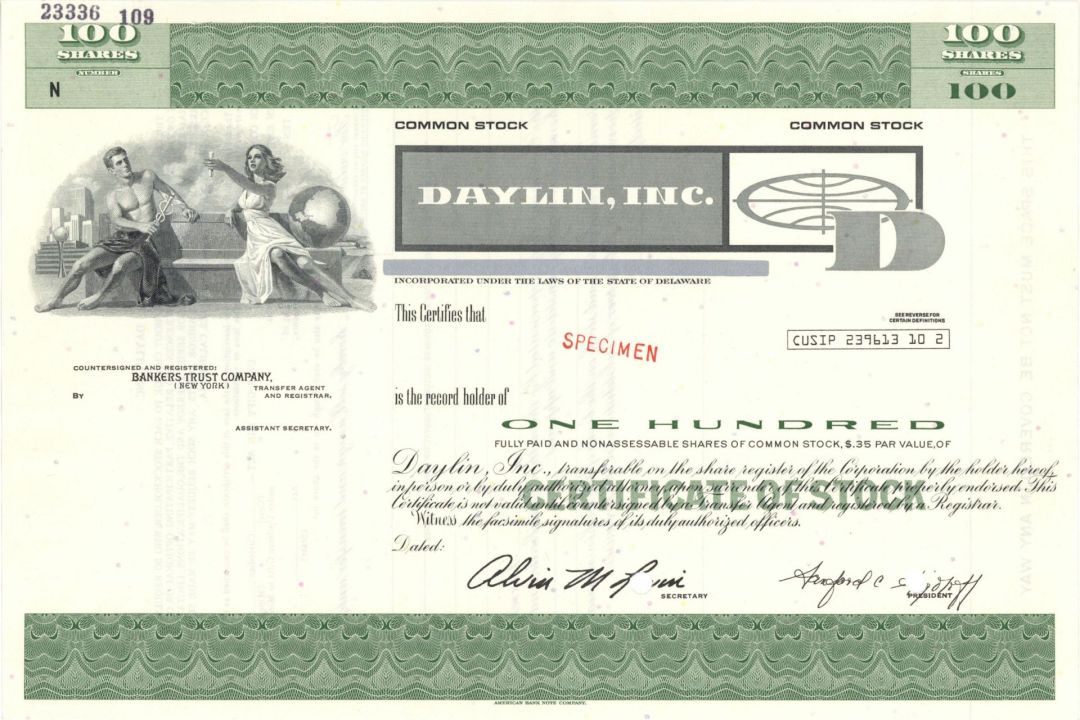Daylin, Inc. - Specimen Stock Certificate
Inv# SE3942 Specimen StockNew York
Specimen Stock printed by American Bank Note Company.
Daylin, Inc. was a major retail conglomerate based in Los Angeles and later Beverly Hills, California. Its best-known unit was Handy Dan Improvement Centers, which prefigured The Home Depot; the company also briefly owned London Drugs as well as Great Eastern, which gave rise to Linens 'n Things. Amnon Barness, an Israeli immigrant, co-founded the company in 1960 with an investment of $10,000. The company grew aggressively over the next two decades by acquiring retail operations around the United States, notably drugstores, home improvement centers, and discount stores. By 1969, Daylin had 50 corporate divisions and subsidiaries employing around 13,000 employees. In 1973 it was reported to operate 700 stores.
By mid-1974, Daylin's aggressive expansion, intense local competition, and high indebtedness in a high-interest rate economic environment had led to significant financial problems, and the company began to sell off underperforming assets, including its drugstore operations. Arthur Blank, who had joined the company when Daylin acquired his family's pharmacy and risen to president of the Elliott's Drug Stores/Stripe Discount Stores unit, was invited to join Handy Dan by Bernard Marcus. In January 1975, Sanford C. Sigoloff, who had just successfully lead Republic Corporation through restructuring, was brought in as president to oversee a turnaround. Daylin filed for Chapter 11 reorganization on February 26, 1975, the second largest retail bankruptcy within a year. Daylin was accordingly delisted from the New York Stock Exchange. Sigoloff became known for his "slash-and-burn" strategy of appeasing investors at the expense of employees during restructuring, for which he was dubbed "Ming the Merciless" and "Mr. Chapter 11." Following his 260-page plan, which employees called the I.B.B. ("Infamous Black Book"), Sigoloff fired more than half the firm's 16,000 employees, but brought Daylin out of bankruptcy in 18 months. The Handy Dan and London Drugs operations were not included in the filing; women's clothing chain Diana, Handy Dan, and a line of hospital pharmacies would form the core of the surviving business. Sigoloff came into conflict with Marcus and Blank over the structure and control of the Handy Dan division. In 1978 he fired them, ostensibly for allowing an employee to set up a fund to improperly fight a unionization effort in San Jose, California stores. Marcus and Blank founded The Home Depot the same year. On January 5, 1979, W. R. Grace and Company, a conglomerate which already owned numerous hardware chains including Orchard Supply, made an unsolicited offer to acquire Daylin. It completed the acquisition on March 19.
Stock and Bond Specimens are made and usually retained by a printer as a record of the contract with a client, generally with manuscript contract notes such as the quantity printed. Specimens are sometimes produced for use by the printing company's sales team as examples of the firms products. These are usually marked "Specimen" and have no serial numbers.











Ebay ID: labarre_galleries